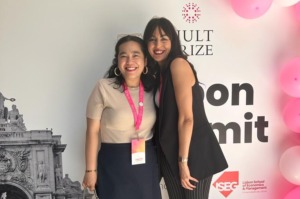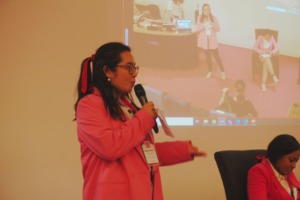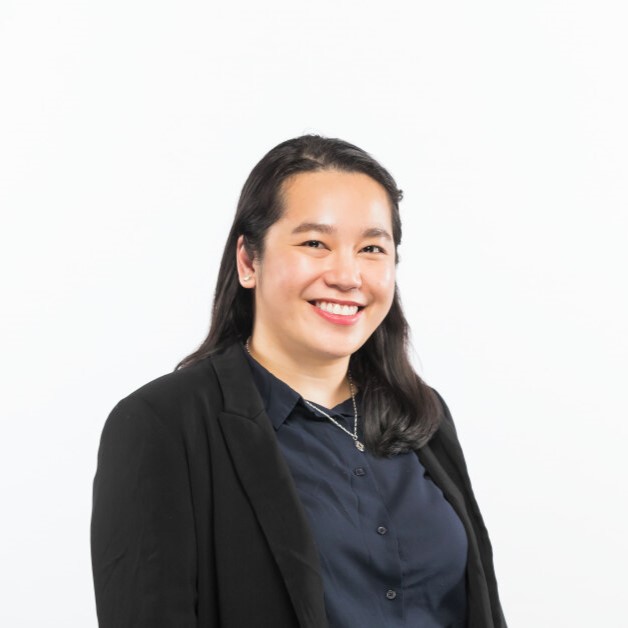Breaking New Ground: Organising Cranfield’s first Hult Prize OnCampus Programme
14/09/2023
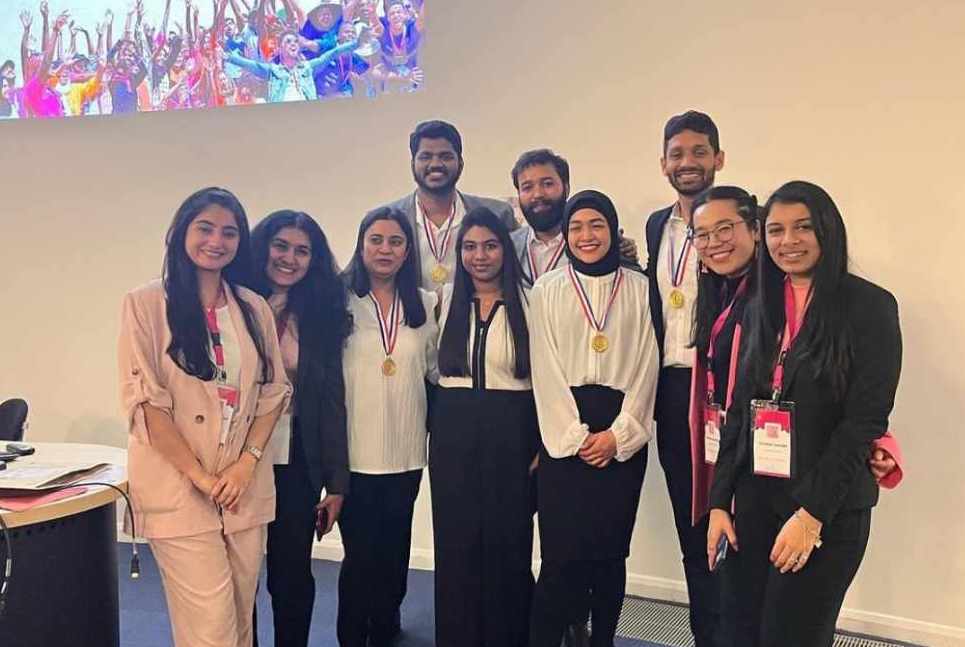
The Hult Prize is a year-long global competition challenging young people to solve the world’s most pressing issues by creating innovative social ventures. This year, the challenge was to create a for-profit social venture in the fashion industry. The OnCampus Programme serves as the first phase of the competition. In this programme, student volunteers, known as Campus Directors, organise training programmes and community events at their universities focused on that year’s challenge.
How I got involved
I first got involved with Hult when our cohort’s competition reps, Shivanshi Marwah and Mrinal Bhatnagar, included it as part of the list of competitions MBA students could join. I was ‘eyeing’ competitions related to sustainability to align with my desired career pathway that I wanted to undertake after completing my MBA so the Hult Prize was aligned with my aspirations.
Upon further discussion with the reps, we found out that somebody had to step up as the Campus Director as that person would need to organise the event on the campus for our cohort to join the competition. As I already had three other competitions that I wanted to join at that time, I thought I could do something different for this one. I used to organise events when I was an undergrad and I thoroughly enjoyed that experience. I thought it would be great to relive that same feeling of fulfilment.
The process of organising the competition
While I raised my hand for the role in the cohort, I still needed to be interviewed and officially appointed by the Hult Prize team as Cranfield University had never had a Campus Director before. That was the first time I met Ghada, the regional manager for Europe and the one who has championed me from day one from Hult. I left that interview feeling invigorated and ready to take on the challenge of creating the first-ever Hult Prize OnCampus Programme at Cranfield. It felt great to be part of a global movement and pioneer something so impactful in the university.
However, before I could even dream of sending a Cranfield team to the global stage, I needed to talk to the MBA director, Dr. Leila Alinaghian, about the plans I had for the OnCampus Programme and the potential cost that it would entail. As this was the first of its kind to be organised in the university, finding a budget for it was tricky. I was hoping to get 15 teams involved, the minimum for the OnCampus programme to be recognised by the Hult Prize as a qualifying round for the Regional Summits.
However at that time, I only had around three or four teams from the MBA cohorts as the competition hadn’t yet been publicised to the MSc’s. It was certainly challenging but I felt supported by Leila who encouraged me to open up the competition to my peer group which enabled me to develop my leadership skills as well.
The next step was assembling my organising team. I wanted to form a small but productive team to achieve the most efficient results. I already knew that I wanted to get people from different cohorts to create the maximum reach that we could for the event, but I was mindful that that scheduling would be difficult if there were too many people involved. When I invited applications to join the committee, I was overwhelmed to receive over 15 applications as there were only six positions available!
The Dream Team
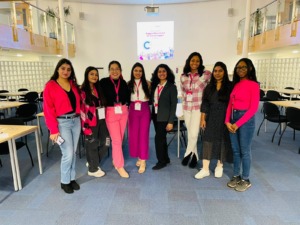
I was delighted to appoint six committee members: Sukhyna Sultan and Anjali Sanjay from MBA, Ibhade (IB) Akpede from MSc Management and Entrepreneurship (MENT), and Mrinalini Venugopal, Oluwapamilerin (Erin) Ojo, and Evanshi Jhaveri from MSc in Management (MiM). I didn’t intend to form an all-girls team but that was how it ended up. Choosing these six ladies to work alongside me in the journey was the best decision that led to the OnCampus Programme’s success. They were committed to the vision and more hardworking than I could ever hope for.
Support from the University
Finding the rest of the competing teams from other cohorts was the next big challenge. I had committed to finding at least 15 teams and I needed to deliver. Yet again, the Cranfield community surprised me when 19 teams from 11 cohorts registered.
The ‘pieces of the puzzle’ were slowly coming together but I knew that a few big pieces were still missing: namely the support of course directors, Dr. Oksana Koryak (MENT), Professor Michael Dickmann (MiM), and Dr Hendrik Reefke, MSc Logistics, Procurement and Supply Chain Management (LPSCM), as their students comprised the biggest number of participants apart from MBA. I was also thankful for the support of the Bettany Centre, led by Professor Stephanie Hussels (Steffi), as we knew they would connect us to the right network of experts for a social entrepreneurship competition.
When we were able to get everyone on board, it was relatively smooth sailing for the team.
Team successes
Leila, Oksana, and Steffi were key in guiding the team. The different event ideas were run through them, as well as the competition mechanics. After two months of weekly meetings with the organising committee (even over Christmas holidays!), we finally hosted our first in-person event and over the course of one month, all four events were finished and we produced Cranfield’s champion and representative to the regional summits, Innovious who competed in Tunis.
We also sent two other teams who qualified through the worldwide Chance Round. They were Project Gaia, my classmates from the MBA who were the 1st runner-up from the OnCampus Programme, and SAADHA. Project Gaia is a one-stop shop for people looking to sell, buy or recycle clothing and Team SAADHA supports businesses to include repair services in their policies – similar to one of returns. Both teams competed in Lisbon. I was a very proud OnCampus Director having three teams in the regional summits!
As Campus Director, I had the opportunity to join Project Gaia and SAADHA in Lisbon. Project Gaia created a one-stop shop for people looking to sell, buy or recycle clothing and Team SAADHA supported businesses to include repair services in their policies, similar to one of returns.
It was exciting to network with like-minded individuals from all over the world. The Hult community is so inspiring that I left the summit wanting to make sure that I could hand over the OnCampus programme properly to the next generation of Cranfield students so that it could continue its legacy on campus.
Making it to the finals and being nominated for Regional Programme of the Year (Europe)
I was ecstatic when Innovious won the Tunis summit and eventually became one of the six teams that qualified for the global summit in Paris after an intense two-month online accelerator programme. Beyond the competition, they were also invited to present at the G20 Summit in India. That team has exceeded everyone’s expectations. It makes me so proud that an event in Cranfield could produce a team that’s making waves around the world.
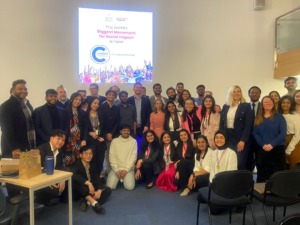
It was the ‘icing on the cake’ for me when I was chosen as one of the five nominees for Regional Programme of the Year (Europe) out of 50 Campus Directors. The support that I received from friends, family, and Cranfield faculty and alumni after that was overwhelming, to say the least. I will be attending the Global Summit in Paris with Innovious and Oksana to represent the university.
It has been a long journey with Hult. By the time the winners are announced on 22 September in Paris, it would have been a 10-month experience for me. I am grateful to the Hult Prize and to Cranfield University for providing such a big platform to showcase my leadership skills and to create connections with people from different parts of the globe who have the same passion for sustainability and entrepreneurship.
Read more about Team Innovious’ journey to the G20 here.
We wish Angelica and Innovious the very best of luck for the Hult Prize finals. We are very proud of your achievements and will be rooting for you all.
Categories & Tags:
Leave a comment on this post:
You might also like…
From classroom to cockpit: What’s next after Cranfield
The Air Transport Management MSc isn’t just about learning theory — it’s about preparing for a career in the aviation industry. Adit shares his dream job, insights from classmates, and advice for prospective students. ...
Setting up a shared group folder in a reference manager
Many of our students are now busy working on their group projects. One easy way to share references amongst a group is to set up group folders in a reference manager like Mendeley or Zotero. ...
Company codes – CUSIP, SEDOL, ISIN…. What do they mean and how can you use them in our Library resources?
As you use our many finance resources, you will probably notice unique company identifiers which may be codes or symbols. It is worth spending some time getting to know what these are and which resources ...
Supporting careers in defence through specialist education
As a materials engineer by background, I have always been drawn to fields where technical expertise directly shapes real‑world outcomes. Few sectors exemplify this better than defence. Engineering careers in defence sit at the ...
What being a woman in STEM means to me
STEM is both a way of thinking and a practical toolkit. It sharpens reasoning and equips us to turn ideas into solutions with measurable impact. For me, STEM has never been only about acquiring ...
A woman’s experience in environmental science within defence
When I stepped into the gates of the Defence Academy it was the 30th September 2019. I did not know at the time that this would be the beginning of a long journey as ...

